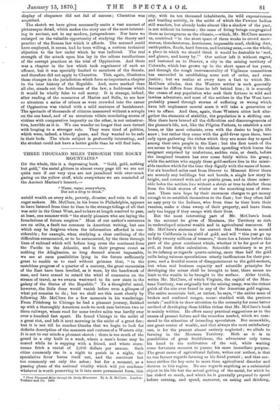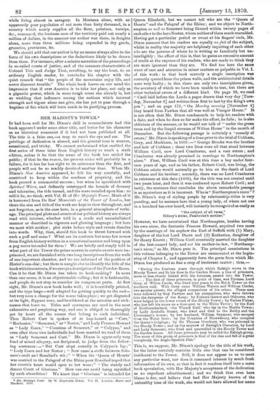THREE THOUSAND MILES THROUGH THE ROCKY MOUNTAINS.*
ON the whole, this is a depressing book. " Gold, gold, nothing but gold," the metal glitters in almost every page till we are not quite sure if our very eyes are not jaundiced with over-much gazing on the yellow stuff, while everywhere we are reminded of the Ancient Mariner's lament,— "Water, water, everywhere, But not a drop to drink."
untold wealth on every side, poverty, disaster, and ruin to all its eager seekers. Mr. McClure, in his home in Philadelphia, appears to have listened from time to time to the strange tidings of all that was astir in the Great West, and to have at length resolved to pass, at least, one summer with " the sturdy pioneers who are laying the foundations of future empires." Most of our author's sentences are on stilts, a fault too common in American writing, but one which may be forgiven where the information afforded is con- siderable ; for example, when studying a clear outlining of the difficulties surmounted, or to be surmounted, by the three through lines of railroad which will before long cross the continent from the Pacific to the Atlantic, and in their progress count as nothing the Alleghenies, so long deemed almost impassable, we see at once possibilities lying in the future sufficiently great to enable us to read without grimace that, " in the matchless progress of a quarter of a century, the great mountains of the East have been levelled, as it were, by the handiwork of man, and have ceased to retard the whirl of commerce on the stream of travel, as we swarm westward to fix new stars in the galaxy of the States of the Republic." To a thoughtful mind, however, the little done would vanish before even a glimpse of what yet remains to do ; but we shall see this most clearly by following Mr. McClure for a few moments in his wanderings. From Pittsburg to Chicago he had a pleasant journey, finished up with a thoroughly American neck-to-neck race between two or three railways, whose road for some twelve miles was hardly ever over a hundred feet apart. He found Chicago in the midst of a great riot, and left it next morning in the midst of a great fire ; but it is not till he reaches Omaha that we begin to look for definite description of the manners and customs of a Western city. It is not to our minds a pleasant sketch ; there is too much of the gourd in a city built in a week, where a man's house may be reared while he is supping with a friend, and where store- rooms fetch a rental of 2,000 dollars per annum. Such cities commonly rise in a night to perish in a night, the speculative fever burns itself out, and the survivors but too commonly eat only the ashes ; but for a moment, as a passing phase of the national vitality which will yet condense whatever is worth preserving in it into more permanent form, this • Three Thousand Miles through Me Rocky Mountains. By A. IL McClure. London : Trilbner and Co. 1869. city, with its ten thousand inhabitants, its wild expensiveness and bustling activity, in the midst of which the Pawnee Indian still wanders, but already looks almost like a shadow of the past, is not without its interest ; the mass of living beings congregated there as incongruous as the climate,—which, Mr. McClure assures us, contrived " in the short space of three weeks to crowd snow- storms, thunderstorms, hurricanes, impassable mud, choking dust, earthquakes, floods, hard freezes, and burning suns,—on the whole, a place in which we should think it would be desirable to ' nod, and glance, and hurry by.'" Our author left it without regret, and hastened on to Denver, a city in the mining territory of Colorado, which has grown up in the short space of ten years, and through the rough instrumentality of Vigilance committees has succeeded in establishing some sort of order, and even justice ; but we realize at every turn a fact to which Mr. McClure alludes, that the Western settler is such generally because he differs from those he left behind him ; it is scarcely the cream of any population who seek their fortune in wild and lawless adventure, and most of the settlers in the Far West have probably passed through storms of suffering or wrong which have left unpleasant mental scars it will take a generation or two to efface. And then, again, these Western cities lack alto- gether the elements of stability, the population is a shifting one Men there have braved all the difficulties and discouragementa of the pioneer's life, not, like the Pilgrim Fathers, to establish a new home, or like most colonists, even with the desire to begin life anew ; but rather they come with the gold-fever upon them, bent only upon gathering the riches which they are some day to spend among their own people in the East ; but the first touch of the ore seems to bring with it the reckless spending which leaves the emigrant surprised by misfortune, sudden ruin, or death, before the imagined treasure has ever come fairly within his grasp ; while the settlers who supply these gold-seekers live in the miser- able ranches which for the time they dignify with the name of home. For six hundred miles east from Denver to Missouri River there are scarcely any buildings but sod hovels, a single low story In height, and covered with sod or prairie grass, and in these miser- able holes the settlers live without a shrub or tree to shelter them from the bleak storms of winter or the scorching suns of sum- mer. These men hope by their enormous charges to get money enough to re-establish themselves in the East ; but they often fall an easy prey to the Indians, who from time to time burn their ranches, make a clean sweep of their property, and leave them only too happy if they escape with their lives.
But the most interesting part of Mr. McClure's book is the account he gives of Montana, the Territory so rich in undeveloped mineral wealth and in agricultural resources. If Mr. McClure's statement be correct that Montana is second. only to California in its yield of gold, and will " this year go up to fully twenty millions of treasure," there lies a future before this. part of the great continent which, whether it be for good or for evil, at least defies calculation. Scientific machinery is as yet in its infancy as regards quartz-mining, more than half the gold mills being ruinous speculations utterly inefficacious for their pur- pose, and a fruitful source of disappointment to the gold-seekers, but when real business capacity and scientific principles for developing the mines shall be brought to bear, there seems no.. limit to the wealth to be brought to the surface. Alder Gulch, writes Mr. McClure, of which Virginia, the capital of the Mon- tana Territory, was originally but the mining camp, was the richest. gulch of the size ever found in any of the American gold regions. The entire mountain belt, or rather, he says, " the entire mass of broken and confused ranges, seems studded with the precious- metals ;" and it is to draw attention to the necessity for some better method of developing these hidden riches that Mr. McClure's book is mainly written. He offers many practical suggestions as to the- causes of present failure and the remedies needed, which we com- mend to the attention of intending speculators. But meanwhile, one great source of wealth, and that always the most satisfactory one, is for the present almost entirely neglected ; we allude to.
farming in the Montana Territory. Rich as it is in possibilities of great fruitfulness, the adventurer only turns his hand to the cultivation of the soil, while waiting some fortunate moment to pursue his more immediate purpose. The great cause of agricultural failure, writes our author, is that no one farmer regards farming as his fixed pursuit ; and that sen- tence strikes the key-note to more than agricultural disorder and distress in this region. No one regards anything as a substantial. object in his life but the actual getting of the metal, for which he has risked so much, and which he is generally prepared to spend. before earning, and spend, moreover, on eating and drinking, while living almost in savagery. In Montana alone, with an apparently poor population of not more than forty thousand, in a country which nearly supplies all the flour, potatoes, turnips, &c., consumed, the business men of the territory paid out nearly a million of dollars, in the summer our author was there, in freights alone, more than three millions being expended in dry goods, groceries, provisions, &c.
We should add that our author is by no means always alive to the force of his own descriptions or the deductions likely to be drawn from them. For instance, after a minute narration of the proceedings in so-called courts of justice, and of the manners characteristic of Colonel This and Judge That, revolting, to say the least, to an ordinary English reader, he concludes his chapter with the quiet remark that " the people of the mountains enjoy life, and never discount trouble." The whole book leaves on our mind the impression that if ever America is to take her place, not only as a gigantic power, which in some rough sense she already is, but as wielding that influence among the nations which internal strength and vigour alone can give, she has yet to pass through a baptism of fire which will burn much in its purifying process.































 Previous page
Previous page